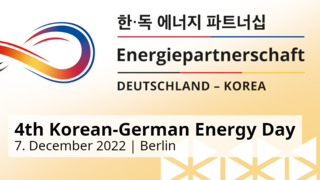4th Korean-German Energy Day

Find the full report of the conference here.
The 4th Korean-German Energy Day took place on behalf of the German Federal Ministry for Economic Affairs and Climate Action (BMWK) and the Korean Ministry of Trade, Industry and Energy (MOTIE) as a physical conference in Berlin. It was co-organized by the Korean-German Chamber of Commerce and Industry (KGCCI) and adelphi, and supported by the OAV – German Asia-Pacific Business Association, the IER – Institute of Energy Economics and Rational Energy Use at the University of Stuttgart, and the Wuppertal Institute.
The main topic of the 4th Korean-Germany Energy Day was “Net Zero: Embrace the opportunities of the Energy Transition”. Aligned with the event’s title this year’s Korean-German Energy Day explored different opportunities of the energy transition against the backdrop of this challenging time of global energy insecurity that we are currently facing.
The conference was opened with video messages from the co-hosts Dr. Patrick Graichen, State Secretary at the German Federal Ministry for Economic Affairs and Climate Action (BMWK), and Mr. Young-Ghil Cheon, Deputy Minister for Energy Industry at the Korean Ministry of Trade, Industry and Energy (MOTIE). Both stressed the urgency of joint action through deepened international cooperation and the particular importance of strengthening energy security and the efforts towards carbon neutrality. As industry representatives, Ms. Danielle Jarski, Chief Development Officer (CDO) Offshore Wind of RWE Renewables, and Mr. Seong-Jun Bae, Vice President for Energy Strategy of SK ecoplant, provided insights from the German and Korean industry perspective. Both highlighted their companies’ efforts in contributing to a fully renewable energy supply, in the transition towards a circular economy and expressed their intention to deepen cooperation with Korean and German partners, respectively.
The remainder of the day was filled with insightful presentations on the current status of hydrogen policies and hydrogen pilot projects from both Germany and Korea, on energy efficiency best practices and the effectiveness of policy measures to increase energy efficiency. Three distinct panel discussions with diverse perspectives from experts in policy, industry, academia and research on (1) the economic opportunities of the energy transition, (2) the current status and industry examples for clean hydrogen, and (3) the effectiveness of different energy efficiency policy measures, completed the conference.
The event in retrospect provided a platform for energy experts from government, industry, research and civil society to exchange views, engage with one another, finally network again in face-to-face encounters and learn from each other’s experiences.